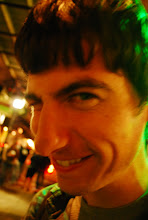On this birthday, another alone - last year was spent by myself in NM - I know I have no need for gifts. What could I ask for? Sure, there's books I want, but I have one I'm reading now. I have pens to write with, paper to write on, the art supplies I presently want. And I have a job now to help me get the things I need or may later desire while most of my amenities are paid for by the school. No, I have no need for anything more.
But it is today that I realize that the gifts I've been given have never come wrapped in paper or sealed in envelopes. No balloons or surprises or cakes amount to the gift of the family who loves me and has cared deeply for me these 25 years. Today I'm not reminded so much that another year has passed, that I'm getting older - but rather that for all these years, loving eyes have watched me, worried about me, cheered for me, and continue to do so.
And whereas the wrapping paper and cards and celebrations have represented the love, I'm happy that this birthday I can say "Thank you" for the same gift I've always been given, without fail, for 25 years.

I tried for a better picture that had Amanda more in the middle, but in the process, I knocked the ice cream off my cone :( but I caught it! :) and put it back on the cone and enjoyed.
By the way, yes, that IS Baskin Robbins!
My birthday was a slow, lazy Sunday. I woke up, hung around the apartment and played guitar. I went out for coffee and finished the book I've been reading

Then Amanda called me. Actually, her timing was perfect. I'd just finished my coffee and had two short pages left in the book. So I called her back after I finished, ran home to gather my things, then went to see here in Sanbon. We went for sushi and ate, oh, I'd guess at LEAST twenty pieces for about 15 bucks, then we left to run a quick errand and back to her apartment to do art. We hung out, listened to music, then went out for ice cream. After ice cream, we headed back, I went to the train station and headed home.
Train stations on Sunday nights are great. It's like going to a Ranger game and waiting around after everyone has left, like I used to do with Chris Swearengin. There's quiet chatter about, the evidence of the day's happenings with trash littered about, a man on his cellphone having hushed conversation, the evening breeze brushing through from the dark, into the fluorescent lights of the platform, and back out. Occasionally, the fast-track train roars past and, each time, causes my stomach to fly like a flock of pigeons pecking seeds in the middle of the street as a car approaches. And the engine rushes by and the carriages follow and squeal behind. My train came and I got on and swayed as the car carried *bu-dump bu-dump bu-dump* across a bridge. Outside the glow of neon lights persisted, hoping for the last dollar of the long, seven day week. Just beyond is the dark neighborhood with softly lit streets and white lights shining through ground glass windows that hide the inhabitants inside. I ride above the vacant highway roundabout - everyone's home waiting to start "next week".
I arrived to my junction, stepped to the other side of the platform, my train showed up, and I got on. It was mostly empty and I stood to wait for my stop. The first stop was Myeonghak, then my stop at Anyang. I went up the steps into the station. An old man passed me going the opposite direction with a look that told of his age, that he was tired, and that he didn't like having to stutter step and go around all the people in the still bustling station. He was ready to be home. I walked through the market, which was slowing down for the night, and made it back to my apartment. Once home, I made soup and sat watching a DVD, then went to sleep.
It was a slow relaxing birthday.










